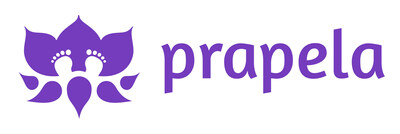Prapela, Inc., announced that the U.S. Food and Drug Administration has granted Breakthrough Device Designation to explore the use of its proprietary stimulation to treat apnea of prematurity, a cessation of breathing for 20 seconds or longer and a major morbidity of preterm infants.
- FDA Breakthrough Device Designations speed up the development and review of medical devices that can improve the lives of people with life-threatening or debilitating conditions.
- Every year, approximately 1.6 million newborns will experience clinically significant apnea.
- Prapela's stimulation pad could become available sooner as a new treatment option for preterm newborns experiencing apnea.
BIDDEFORD, Maine, Jan. 5, 2023 /PRNewswire/ -- Prapela, Inc., announced that the U.S. Food and Drug Administration (FDA) has granted Breakthrough Device Designation to explore the use of its proprietary stimulation to treat apnea of prematurity (AOP), a cessation of breathing for 20 seconds or longer and a major morbidity of preterm infants. Breakthrough Device Designation accelerates the review of innovative medical devices that can improve the lives of people with life-threatening or irreversible debilitating conditions.
Prapela's device is a mattress pad producing a unique vibration that boosts the brain's control of breathing. Placed inside an incubator, radiant warmer, or hospital bassinet, preterm infants laying on Prapela's pad experience a subarousal, stochastic stimulation that improves respiratory rhythm. While Prapela's technology previously received Breakthrough Device Designation for improvement of breathing in newborns with prenatal opioid exposure, a study published in Pediatrics1 suggests Prapela's stimulation could also help decrease apneic and oxygen desaturation events in preterm infants. Prapela is working with Tufts Medical Center and the University of Alabama at Birmingham to complete a large clinical trial to evaluate the device's safety and effectiveness for AOP. A significant benefit of Prapela's pad is that no wires or leads are connected to infants to deliver the stimulation. A simple on/off button activates the pad's stimulation.
For babies that suffer from AOP, a condition that costs the U.S. more than $17 billion in annual direct costs, Prapela's stimulation has the potential to provide the first new treatment for AOP in over twenty years. Caffeine citrate, the most frequently used treatment, is considered safe and effective at recommended doses. However, in the sole trial supporting its FDA clearance, caffeinated newborns still experienced an average of 4.9 apnea events on day 2 of treatment, and 75.6 percent continued to experience apnea for 7 to 9 days.2 After repeated apnea episodes, clinicians often continue treatment with caffeine beyond recommended levels.3 One study funded by the National Institute of Child Health and Human Development (NICHD) reported 410 preterm newborns were given median caffeine doses 2X higher and 5X longer than FDA-labeled recommendations at four different neonatal intensive care units.4 Prapela's goal is to have its stimulation used adjunctively and consistent with the FDA-approved labeled instructions for safe and effective use of caffeine citrate.
"As a 2X Breakthrough Device Designation recipient, Prapela is honored to collaborate with the FDA and our clinical partners to provide newborns and their caregivers with a new option to help babies breathe," said John Konsin, CEO and Co-founder, Prapela, Inc.
Prapela's stimulation technology for AOP and NOWS is limited to investigational use only.
About Prapela
Prapela, Inc. is a pediatric medical device company improving exclusively licensed stimulation technology from the Wyss Institute for Biologically Inspired Engineering at Harvard University, the University of Massachusetts Medical School, and Massachusetts General Hospital. Since 2017, the company has received over $4.6M in awards, grants and non-dilutive support. The company's core competency is the application of stochastic stimulation to improve breathing in newborns. More recently, the National Capital Consortium for Pediatric Device Innovation (NCC-PDI) announced Prapela as the 1st place award winner in its FDA-funded Pediatric Device Consortium program. The award was a result of Prapela's selection in the MedTech Innovator Accelerator program for 2022.
Find out more about Prapela at www.prapela.com.
For further information:
John Konsin, Prapela Co-founder and CEO; johnkonsin@prapela.com
978-760-4988
|
1 Smith V. C., Kelty-Stephen D., Qureshi Ahmad M., Mao W., Cakert K., Osborne J., & Paydarfar D. (2015). Stochastic Resonance Effects on Apnea, Bradycardia, and Oxygenation: A Randomized Controlled Trial. Pediatrics, 136(6), e1561–e1568. |
|
2 Erenberg, A., Leff, R. D., Haack, D. G., Mosdell, K. W., Hicks, G. M., & Wynne, B. A. (2000). Caffeine citrate for the treatment of apnea of prematurity: a double-blind, placebo-controlled study. Pharmacotherapy, 20(6), 644–652. |
|
3 Chavez L, Bancalari E. Caffeine: Some of the Evidence behind Its Use and Abuse in the Preterm Infant. Neonatology. 2022;119(4):428-432. |
|
4 Puia-Dumitrescu, M., Smith, P. B., Zhao, J., Soriano, A., Payne, E. H., Harper, B., Bendel-Stenzel, E., Moya, F., Chhabra, R., Ku, L., Laughon, M., Wade, K. C., & Best Pharmaceuticals for Children Act–Pediatric Trials Network Steering Committee (2019). Dosing and Safety of Off-label Use of Caffeine Citrate in Premature Infants. The Journal of pediatrics, 211, 27–32.e1. |
![]() View original content to download multimedia:https://www.prnewswire.com/news-releases/prapela-receives-fdas-breakthrough-device-designation-to-investigate-the-use-of-stimulation-to-treat-apnea-of-prematurity-301715024.html
View original content to download multimedia:https://www.prnewswire.com/news-releases/prapela-receives-fdas-breakthrough-device-designation-to-investigate-the-use-of-stimulation-to-treat-apnea-of-prematurity-301715024.html
SOURCE Prapela, Inc





